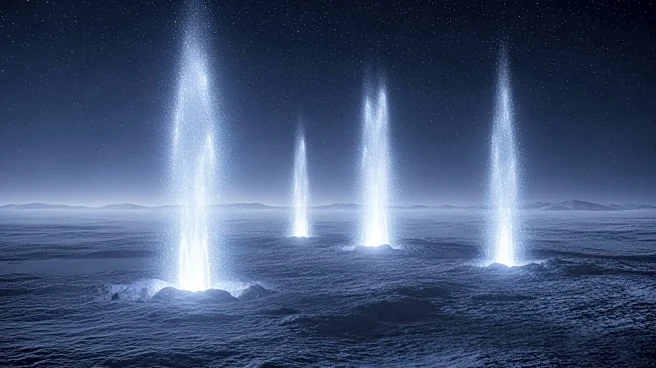What is the story about?
What's Happening?
Recent findings presented at the EPSC-DPS2025 Joint Meeting in Helsinki suggest that organic molecules detected in the plumes of Saturn's moon Enceladus may be formed through radiation-driven chemistry on its icy surface, rather than originating from its subsurface ocean. Dr. Grace Richards from the Istituto Nazionale di Astrofisica e Planetologia Spaziale highlighted that while these molecules are crucial in assessing Enceladus's habitability, their formation through radiation challenges previous assumptions. The Cassini spacecraft, which discovered the plumes in 2005, found them rich in salts and organic compounds, initially suggesting potential for prebiotic molecules. However, experiments simulating Enceladus's surface conditions showed that radiation could create these compounds, raising questions about their astrobiological significance.
Why It's Important?
The discovery has significant implications for astrobiology, as it challenges the assumption that organic molecules in Enceladus's plumes are indicative of life-supporting conditions in its subsurface ocean. If these molecules are formed by radiation, it suggests that similar processes could occur on other icy bodies, potentially misleading scientists about their habitability. This finding urges caution in interpreting data from space missions and highlights the need for more detailed studies to differentiate between ocean-derived organics and those formed by surface radiation. The research could influence future mission designs and objectives, particularly those targeting icy moons and planets.
What's Next?
Further missions and studies are required to better understand the processes at play on Enceladus and similar celestial bodies. A proposed Enceladus mission, part of the European Space Agency's Voyage 2050 recommendations, aims to gather more data to distinguish between molecules formed by subsurface ocean processes and those created by radiation. This mission could provide critical insights into the moon's habitability and the broader implications for life in the universe. Researchers will continue to explore the chemical interactions on Enceladus's surface to refine models of its environment.
















